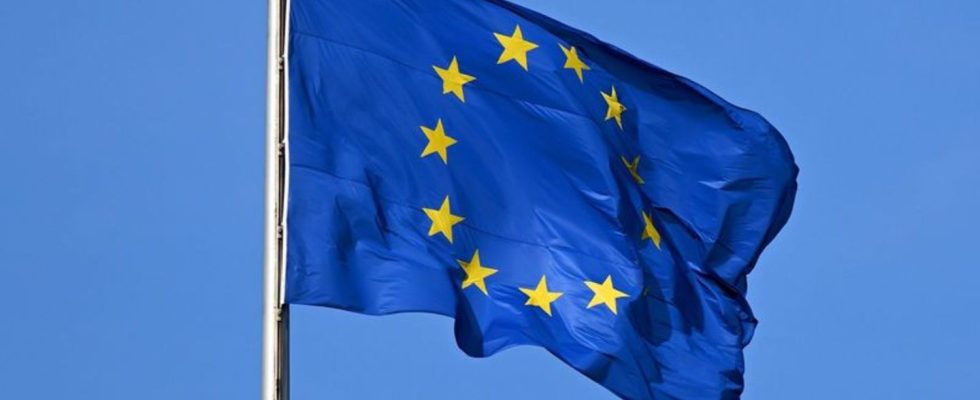study
EU proposal against child abuse violates fundamental rights
The flag of the EU on the Reichstag is waving in the wind. photo
© Monika Skolimowska/dpa
Photos of abused children are flooding parts of the internet. The EU Commission wants to take action against this and also have some encrypted communication screened. Can this work?
According to a study, the EU Commission’s plans to combat images of abused children on the Internet violate the basic rights of Internet users and are not very effective. According to an assessment by the European Parliament’s research service, the number of reported cases of abuse is likely to increase significantly. At the same time, however, the accuracy of the hits is likely to decrease significantly and the burden on the investigating authorities will increase.
The German government also has serious concerns about the EU Commission’s proposal. Above all, she rejects the so-called “chat control”, as can be seen from a statement that was coordinated between the ministries for family, justice, home affairs, family and digital affairs and is available to the dpa. It says: “From the point of view of the federal government, significant changes in the draft regulation are necessary so that it can be approved from a German point of view.”
The federal government is in favor of a European approach to create a clear legal basis for the fight against sexual abuse of children and young people. Measures that lead to the scanning of private encrypted communication must be ruled out, it said.
Tag “Chat Control”
In May 2022, EU Interior Commissioner Ylva Johansson presented a proposal for a regulation to curb the spread of images showing the sexual abuse of children. Critics use the keyword “chat control” for this.
“Only rarely do experts from the European Parliament present such a devastating verdict on legislative projects of the EU Commission,” commented the FDP MEP Moritz Körner on the evaluation of the scientific service. “The EU Commission would be right to withdraw its proposal immediately.” Pirate MP Patrick Breyer announced: “The planned, suspicion-free, comprehensive message and chat control destroys the digital secrecy of letters and violates fundamental rights.” Children are not helped with a regulation “that will inevitably fail before the European Court of Justice because it violates the Charter of Fundamental Rights”.
Federal Minister of Justice Marco Buschmann (FDP) wrote on Twitter on Thursday: “Chat control has no place in the rule of law. Especially because it obviously does more harm than good from the point of view of law enforcement.”
Above all, it is criticized that the plans not only provide for tracking down already known representations that are sent via online messenger. In addition, they also include the detection of new images and so-called grooming, in which adults seek contact with minors with the intention of abusing them.
So far, Johansson has defended her proposal primarily with reference to planned protective measures. First of all, all companies have to analyze how great the risk is that child pornography will be shared on their sites. If so, they would have to take countermeasures. If this is not sufficient, a court or other authority can order the content to be scanned.
“Overall Effectiveness Limited”
The research service of the European Parliament contradicts the Swede in its 140-page investigation. He emphasizes several times that the need to protect children from abuse is undisputed. However, the scientists’ assessment is clear: “It can be concluded that the overall effectiveness of the proposed legislation is likely to be limited.” The proposed protective measures are insufficient.
One reason is, among other things, that the technologies for recognizing new content and grooming are imprecise. “The majority of experts surveyed believe this will result in an increase in reported content and a decrease in accuracy.” This will have a significant impact on the burden on the investigative authorities. The scientists also point out that some perpetrators would switch to the Darknet.
The survey emphasizes that the proposal would violate, among other things, the ban on blanket data retention. This violation of the EU Charter of Fundamental Rights cannot be justified. Encrypted communication is fundamentally called into question by the plans. The authors of the survey, on the other hand, rate the planned establishment of an EU center in the fight against child abuse as fundamentally positive.
Before the scientific service, Europe’s top privacy advocates had already passed a devastating verdict on the proposals. Here, too, the focus was on serious concerns with regard to the privacy and personal data of individuals.
So far, neither the Parliament nor the EU states have agreed on a position on the proposal. Once both sides have positioned themselves, they have to negotiate with each other. They don’t have endless time. A transitional arrangement expires on August 3, 2024. The platforms are currently allowed to scan the messages of their users – but only for material that is already known, not for new depictions or grooming.

